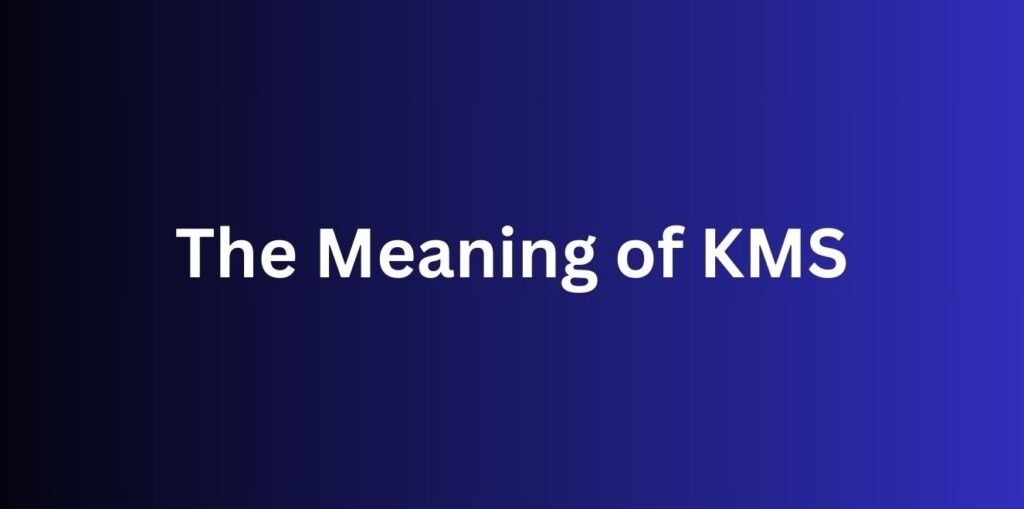In today’s digital age, communication has evolved to include various forms of slang and abbreviations, especially among younger generations. One such abbreviation that you may come across in text messages and online conversations is “KMS.” If you’re unfamiliar with this term, it’s important to understand its meaning and usage to better comprehend the messages you receive. In this comprehensive guide, we will delve into the depths of what “KMS” means, its origin, and how it is used in different contexts.
Understanding the Meaning of KMS in Text
When encountering the abbreviation “KMS” in text messages or online chats, it is crucial to decipher its intended meaning. “KMS” stands for “kill myself,” which may initially seem alarming or distressing. However, it’s important to note that in many cases, this term is not used literally to indicate someone contemplating self-harm or suicide. Instead, it is often employed as an exaggerated expression of boredom, frustration, or embarrassment.
The Origin of KMS

Pinpointing the exact origin of internet acronyms can be challenging. However, it is believed that “KMS” first gained popularity around 2009 on the social media platform Twitter. At that time, Twitter had a character limit of 140 characters per tweet, leading users to resort to abbreviations and acronyms to convey their messages concisely. The brevity and convenience of “KMS” made it a popular choice for expressing boredom, awkwardness, or misfortune.
Exploring KMS Usage in Different Contexts
The usage of “KMS” can vary depending on the context in which it is employed. It’s essential to consider the tone, emotional state, and previous conversations to accurately interpret its intended meaning. Let’s explore some common scenarios where “KMS” is used:
1. Casual and Joking Conversations
In many instances, “KMS” is used ironically or sarcastically in casual conversations among friends. Teenagers, in particular, may employ this abbreviation to add humour or exaggeration to their stories or experiences. For example, a teen might text, “I asked Stacey to the prom this morning. She said no. KMS.” In this context, “KMS” is not a serious expression of self-harm but rather a playful way to convey disappointment or frustration.
2. Expressing Everyday Annoyances
“KMS” is often used to express minor inconveniences or frustrations in everyday life. It serves as a way to vent and seek validation from friends. For instance, a text like, “Can’t go to the party tonight because of this science assignment from Mr. Jenks. KMS” illustrates how the term is used to express annoyance or disappointment over an obstacle.
3. Restlessness and Boredom
Sometimes, individuals use “KMS” to express restlessness or extreme boredom. This usage typically occurs when someone is enduring a tedious or uninteresting situation. It serves as an exaggerated way to express impatience or a desire for something more engaging. For example, a person might text, “My mom dragged me to my sister’s recital. It’s three hours long. KMS” Here, “KMS” indicates the person’s longing for the event to end.
4. Serious Conversations and Cry for Help
While “KMS” is often used lightheartedly, it’s crucial to be aware that it can also be employed as a genuine cry for help. In some cases, individuals may use this abbreviation to express their feelings of depression, loneliness, or even suicidal ideation. It’s important to recognise the signs and take such conversations seriously. If someone repeatedly uses “KMS” in the midst of a serious conversation, it may be an indication that they require immediate support and intervention.
Decoding KMS on Different Social Media Platforms
The usage and interpretation of “KMS” can vary across different social media platforms. Let’s explore how it is commonly employed on popular platforms:
KMS on Text Messages
When encountering “KMS” in a text message, it’s essential to consider the overall context of the conversation. Text messages tend to be more personal and intimate, making the use of “KMS” potentially more significant. However, it’s crucial to analyse the emotional tone, previous conversations, and the relationship between the individuals involved to interpret its meaning accurately.
KMS on Snapchat
On Snapchat, a platform known for its ephemeral nature and playful interactions, “KMS” is often used in a less serious manner. It is frequently employed to add humour or exaggeration to stories or experiences without implying genuine thoughts of self-harm. When encountering “KMS” on Snapchat, it’s important to recognise the platform’s lighthearted context and the playful nature of the communication.
KMS on Other Social Media Platforms
The usage of “KMS” on other social media platforms, such as Instagram, Facebook, or TikTok, can vary. Similar to Snapchat, these platforms often foster a more casual and light-hearted atmosphere. However, it’s crucial to consider the specific context and the individual’s history and emotional state when encountering “KMS” on any social media platform.
Identifying Serious Usage of KMS and Warning Signs
While “KMS” is often used in a non-serious or exaggerated manner, it’s crucial to be vigilant and identify situations where it may indicate genuine distress. Here are some warning signs to be aware of:
History of Depression or Suicidal Thoughts
If an individual has a history of depression, anxiety, or suicidal thoughts, their use of “KMS” should be taken more seriously. It may indicate a deeper emotional struggle, and it’s important to offer support and seek professional help if necessary.
Emotional Language and Distress
Pay attention to the emotional language used alongside “KMS.” If the conversation includes expressions of extreme sadness, despair, or hopelessness, it may be a sign that the individual is genuinely struggling and requires immediate intervention.
Discussion of Self-Harm or Negative Life Situations
If an individual discusses self-harm, expresses a lack of meaning in life, or discusses negative life situations, it’s important to take their usage of “KMS” seriously. These conversations may indicate a cry for help and should be addressed with care and compassion.
Supporting Your Child and Promoting Open Conversation
As a parent, it’s crucial to establish open lines of communication with your child and create a safe space for them to express their feelings. If you encounter your child using “KMS” in a serious conversation, approach the situation with empathy and understanding. Let them know that you are there to support them and encourage them to seek help from trusted adults, such as teachers, counsellors, or mental health professionals.
Conclusion
In conclusion, “KMS” is an internet slang abbreviation that stands for “kill myself.” While it is often used in a lighthearted, exaggerated, or sarcastic manner, it’s essential to be aware of situations where it may indicate genuine distress or a cry for help. Understanding the context, emotional tone, and previous conversations can help decipher the intended meaning of “KMS” in different scenarios. By fostering open communication and providing support, parents can play a vital role in the well-being of their children. Remember to approach sensitive topics with empathy, seek professional help when necessary, and promote a safe and understanding environment for all.
You might also like:


